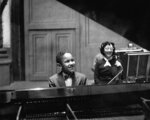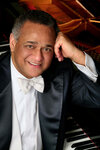Concert pianist Andre Watts, 77, a trailblazing virtuoso of classical music, spent his childhood and teenage years in Germantown.
This item is available in full to subscribers.
We have recently launched a new and improved website. To continue reading, you will need to either log into your subscriber account, or purchase a new subscription.
If you are a digital subscriber with an active subscription, then you already have an account here. Just reset your password if you've not yet logged in to your account on this new site.
If you are a current print subscriber, you can set up a free website account by clicking here.
Otherwise, click here to view your options for subscribing.
Please log in to continue |


Concert pianist Andre Watts, 77, a trailblazing virtuoso of classical music, died July 12 at his home in Bloomington, Indiana. Watts, whose concert career spanned the globe, spent his childhood and teenage years in Germantown.
Watts was born on June 20, 1946, in Nuremberg, Germany. His father, Herman Watts, was a noncommissioned officer stationed overseas with the U.S. Army during the years following Germany’s defeat in World War II. His mother was Maria (Gusmits) Watts, a Hungarian-born amateur pianist. When Watts was 8 years old, the family returned to the U.S. and settled in the Germantown section of Philadelphia. His parents separated when he was 13.
Watts’ mother was his first piano teacher. Within a few years, however, she wisely recognized his astounding natural talents and sought more professional instruction for her son, who was taught by an all-star team of teaching talent.
As a child prodigy, Watts won several “young pianists” competitions that gave him the opportunity to perform with two of America’s leading orchestras, our own Philadelphia Orchestra and the New York Philharmonic. It was his unscheduled performance with the Philharmonic under Leonard Bernstein, as a replacement for the ailing Glenn Gould, that catapulted him to international fame.
From then on, his name was synonymous with technical wizardry, stylistic panache, interpretive intensity and deeply felt emotional depth. He produced a tone that both glowed and dazzled. He elicited a full panoply of orchestral colors from the piano while reveling in the peculiar characteristics of the instrument, both lyrical and shimmering. His digital technique was ironclad at even the fastest tempos and in the knottiest of passages, yet he never played without a sincere commitment to the musical essence at the heart of the score.
Growing up in Philadelphia, Watts’ first piano teacher of note was Genia Robinar, with whom he studied at the Philadelphia Musical Academy, which eventually became the University of the Arts.
It was Robinar who passed on to Watts the great traditions of 19th century pianism. Born in Odessa, Ukraine, she had studied with the legendary piano pedagogue Theodor Leschetizky, who had been a student of Carl Czerny. Czerny had studied with Ludwig van Beethoven, and Beethoven had been a student of Franz Joseph Haydn. Upon emigrating to the U.S., Robinar studied at the Curtis Institute of Music. Alongside teaching at PMA, she also taught at Settlement Music School’s Mary Louise Curtis Branch in Queen Village.
While at PMA, Watts broadened his studies with Clement Petrillo, a student of the great French concert pianist Alfred Cortot. In time, Petrillo became the dean of faculty at the University of the Arts.
From PMA, Watts continued his piano studies at the Peabody Conservatory of Music of the Johns Hopkins University in Baltimore, Maryland. His teacher there was the American-born virtuoso, Leon Fleisher, who was the most famous student of Artur Schnabel. It was Schnabel who first recorded all 32 piano sonatas of Beethoven and who was also a student of Leschetizky.
All of these influences came together in Watts' playing. His repertoire was gargantuan, ranging from Mozart and Haydn through Schubert and Beethoven into the romantic repertoire and even into the 20th century’s modern styles. He was adept at the solo canon as well as the concerto repertoire, and he appeared with every major symphony orchestra in North America and Europe. His recorded output matched his concert performances, and his interpretations of the music of Franz Liszt established a standard unsurpassed to this day. At his height, he was considered the perfect combination of Artur Rubinstein and Vladimir Horowitz, the two virtuosos of his youth.
I was fortunate enough to share a special relationship with Andre Watts. I also studied with Clement Petrillo at the Philadelphia Musical Academy and, when I subsequently was a student at the Peabody Conservatory, I took part in Leon Fleisher’s masterclasses. One of my fondest memories from Peabody was the day Watts played the Piano Concerto No. 1 in D minor by Johannes Brahms in that masterclass for Fleisher’s coaching. It was an inspiration never forgotten. And whenever I went backstage to greet Watts following a performance, he always assured me that he remembered me from Peabody. Perhaps not – but he was so gracious a gentleman that I always believed him.
Andre Watts lived a full and generous life. Those of us who heard him “live” in concert will never forget him.
You can contact NOTEWORTHY at Michael-caruso@comcast.net.